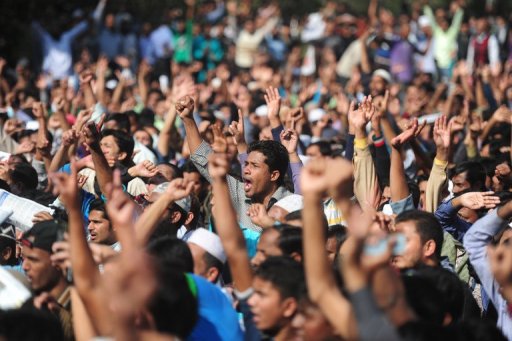Riots broke out in several Bangladesh cities after a court sentenced a senior Islamist opposition official to life in prison for mass murder during the 1971 liberation war against Pakistan.
Abdul Quader Molla, 64, the fourth-highest leader of the Jamaat-e-Islami party, was the first politician to be found guilty by the International Crimes Tribunal, a much-criticised domestic court based in Dhaka.
Molla cried “Allahu Akbar!” (God is greater) and said the charges, which also include crimes against humanity, were false after presiding judge Obaidul Hassan delivered the verdict in a crowded and tightly guarded court.
The judgement sparked immediate protests by Jamaat, the country’s largest Islamic party which enforced a nationwide strike in anticipation of the conviction.
It warned it would resist “at any cost a government blueprint” to execute its leaders.
Police said they had clashed with protesters in the capital Dhaka and in several other cities across the country in the aftermath of the verdict.
In northwestern Rajshahi, police fired tear gas and rubber bullets at about 500 Jamaat supporters who hurled at least a dozen homemade firebombs.
The verdict is the second by the tribunal. On January 21 a top TV preacher who is also an ex-Jamaat official was sentenced to death in absentia for murder and genocide.
Ten other opposition figures — including the entire leadership of Jamaat and two from the main opposition Bangladesh Nationalist Party (BNP) — stand accused of war crimes.
Both Jamaat and BNP have labelled the cases “show trials” aimed at barring the leaders from upcoming polls. International rights groups have questioned the proceedings.
Prosecutors said that during the war Molla was a senior figure in the then-student wing of Jamaat, while studying physics at Dhaka University, and was a member of a pro-Pakistan militia accused of killing hundreds of thousands of people.
Security was tight in the capital with more than 10,000 policemen on patrol. Schools were closed and many shops and businesses shuttered. Motorways linking Dhaka with other cities were largely empty.
Police said a young banker was burnt to death and four people injured on Monday night after a bus was torched by suspected Jamaat activists protesting the war crime trials.
The tribunal, which has no international oversight, was created by the country’s secular government in 2010. It has been tainted by allegations it is politically motivated and targets only senior opposition officials.
The judge in Molla’s case refused a prosecution bid to try him for genocide.
Defence lawyers said Molla, Jamaat’s assistant secretary general, spent the entire time in the nine-month war in his village and alleged that the tribunal severely curtailed their ability to prove his innocence.

COMMENTS
Please let us know if you're having issues with commenting.